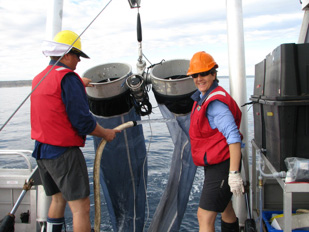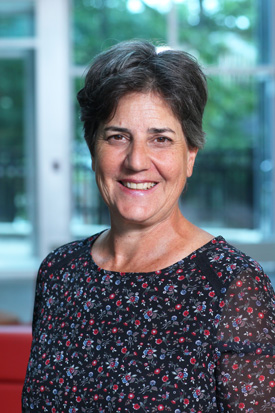This article is part of a series shining a spotlight on the personalities and priorities of Dal's senior leadership team. Revisit previous profiles╠²at the Leadership and Vision website.
ŌĆ£I was talking to a Hawaiian Indigenous leader,ŌĆØ Anya Waite recalls. ŌĆ£He said that instead of ŌĆśWhere are you from?ŌĆÖ, they ask, ŌĆśWhat are your source waters?ŌĆÖŌĆØ
She instantly thought of Pockwock Lake, past Hammonds Plains, from when she was a little girl, before it became the main source of drinking water for much of the Halifax Regional Municipality. She used to camp there with her dad. ŌĆ£It became a part of me,ŌĆØ she says.
For Dr. Waite, joining Dal eight months ago as the associate VP for ocean research and scientific director of the new Ocean Frontier Institute brought her back to her roots. Her father, P.B. Waite, was a prominent history professor at Dal and famously authored the two-volume history of the university, The Lives at Dalhousie. Anya completed her undergraduate studies at Dal before leaving Nova Scotia at 22 to do a PhD at the University of British Columbia. She has since lived and worked in South America, New Zealand, Germany and Australia.
Coming home, she says, has been even better than sheŌĆÖd hoped. This is where she remembers running around in the woods and swimming in lakes, Nova ScotiaŌĆÖs environment shaping who she was and how she saw the world.
ŌĆ£I even just moved into our family home. The depth of the community connections here are so meaningful. I met a guy at Java Blend who knew my mom for 30 years. It was coming full circle.ŌĆØ
Leaving oceanography ŌĆö╠²and finding it again
The circle has been a wide one. She started out studying music ŌĆö violin ŌĆö but transferred to English before realizing she loved science too, and settling on combined majors in English and Biology, with a minor in Chemistry. She recalls spending a summer working with the late Bill Freedman (who chaired the Department of Biology from 2000-2007). ŌĆ£He was a mentor, not just scientifically, but regarding how to approach Nova Scotia as an ecosystem.ŌĆØ
After travels around Europe, Morocco and Turkey, Dr. Waite studied Biological Oceanography at the University of British Columbia under the late Paul J. Harrison. She did a prestigious post-doc at Woods Hole Oceanographic Institution, but found it disappointing, intellectually.
ŌĆ£The conversations were all about money,ŌĆØ she says. ŌĆ£Ideas seemed secondary.ŌĆØ She hadnŌĆÖt expected to find herself in such a dry environment, and it drove her away from oceanography for a time, instead taking a job running a laser microscope at a lab in New Zealand for three years.
While there she gave a talk at the National Institute for Water and Atmosphere. ŌĆ£They invited me to go to sea,ŌĆØ she says. ŌĆ£I hopped on board and felt myself getting dragged back in to exciting conversations about the ocean, wrote some papers, and was sucked back into oceanography.ŌĆØ
 Specifically, she became a professor of Oceanography and Environmental Engineering at the University of Western Australia, and later, professor of Oceanography in the Faculty of Chemistry and Biology at the University of Bremen, and section head of Polar Biological Oceanography at the Alfred Wegener Institute in Bremerhaven.
Specifically, she became a professor of Oceanography and Environmental Engineering at the University of Western Australia, and later, professor of Oceanography in the Faculty of Chemistry and Biology at the University of Bremen, and section head of Polar Biological Oceanography at the Alfred Wegener Institute in Bremerhaven.
ŌĆ£To step into a senior German professorship is a very special privilege,ŌĆØ Dr. Waite says. ŌĆ£YouŌĆÖre expected to bring the full power of your brain. And youŌĆÖre heard.ŌĆØ
Leading a new ocean research partnership
But when the opportunity to head up the new ŌĆö a $220-million international hub for ocean research led by a partnership between Dalhousie, Memorial and UPEI ŌĆö she realized she could have the same sort of opportunity in the home she left, but that never left her.
ŌĆ£It was a difficult decision to leave Germany,ŌĆØ she says. ŌĆ£But at the same time, it was a no-brainer. The conversation is edgy and dynamic here. WeŌĆÖre having conversations with industry, Indigenous communities and the rest of society, hooking science into where it can deliver something.
ŌĆ£The whole mandate is to do excellent science and deliver outcomes to societyŌĆ” to consolidate research so itŌĆÖs more than the sum of the parts.
Dr. Waite is fascinated by the collaborative approach, working with various communities and people with varied areas of expertise: natural and social scientists and engineers, as well as entrepreneurs using science to inform their innovations, from several Atlantic universities. ŌĆ£IŌĆÖve had exceptional conversations almost every day since I started this job.ŌĆØ
╠²
In fact, she describes her daily routine as being focused to constructing those conversations, moving them forward. She says her role requires more listening than speaking.
Fortunately for Dr. Waite, oceanography is by nature a multidisciplinary branch of science, so bringing together varied styles and viewpoints toward a common objective is something she has been trained to do.
 On mentorshipŌĆ”
On mentorshipŌĆ”
ŌĆ£Mentorship is so important, and IŌĆÖve lost some old mentors recently. When itŌĆÖs gone, you really miss it.ŌĆØ
On leadershipŌĆ”
ŌĆ£ItŌĆÖs amazing, thinking back, how huge an impact good and bad leadership has had on my career.ŌĆØ
On giving backŌĆ”
ŌĆ£I wanted to give something back to Nova Scotia that would move the science enterprise in the right direction.ŌĆØ
On serviceŌĆ”
ŌĆ£While my job is to lead, my vocation is to serve.ŌĆØ
Five questions
WhatŌĆÖs your favourite hobby or pastime?
Playing violin ŌĆö chamber music in particular. ItŌĆÖs one of the few things that is so intense, so complex, so demanding, that it clears my head of anything else. Even sports donŌĆÖt do this in the same way.
If you were to leave academia and go into any career you wanted, what would you choose?
Writing. Fiction, poetry, and nonfiction. I love it all.
WhatŌĆÖs the best advice youŌĆÖve ever received?
Famous ecologist Dave Schindler once told me, ŌĆ£DonŌĆÖt work so hard ŌĆö stop now! Just do a few really important things.ŌĆØ ItŌĆÖs not advice IŌĆÖve always followed, but at critical times itŌĆÖs helped me to focus.
Who is a mentor or leader who has inspired you in your life or career?
My mother. She was a demanding intellectual, a passionate and devoted mother, and an ethical leader. She was anti-authoritarian, had been arrested for anti-Nazi activity in her native Croatia and had a disdain for the abuse of power, something that coloured her politics and her personality. We were taught always to question, to respect authenticity and knowledge, and to fight for the truth, however we saw that.
If you could have dinner with one person ŌĆö living, deceased or fictional ŌĆö who would it be and why?
I was going to say Elizabeth Bennet (of Pride and Prejudice), but I think it would be Eleanor of Aquitaine. She was a powerful woman who challenged the men and the rules she interacted with. We named our daughter Eleanor.

